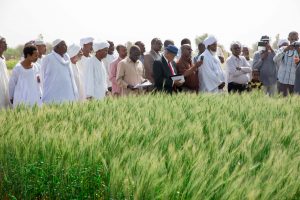Wheat Highlights 2020
As demand for wheat rapidly grows across Africa, Asia, and the Middle East, ICARDA urgently addressing growing climatic challenges, pests, and diseases that hinder domestic production. We do this by generating an effective wheat-breeding strategy and new wheat varieties, alongside the training needed to help them flourish and new technologies and tools. Our improved varieties deliver high-yield potential, resistance and tolerance to abiotic and biotic stresses, and acceptable end-use qualities. We also develop diversified wheat-pulse cropping systems that boost soil biodiversity while improving wheat’s nutritional value.
WHEAT RESEARCH IN 2020
The African Development Bank-funded Technologies for African Agricultural Transformation Wheat Compact (TAAT) project expansion in Ethiopia and Sudan, the fantastic Crop Science Society of America Award for outstanding paper, and our work on wheat in fragile states and territories, can all be found on our highlights page.
Our crop breeding teams are also working alongside other CGIAR Center research teams to develop the new initiatives that will define future approaches to wheat breeding across the globe under the One CGIAR reformulation.
Other 2020 developments in wheat include:
Identifying disease and pests
Our disease and pests research in Turkey is supported by TAGEM (General Directorate of Agricultural Research and Policy, the Ministry of Agriculture and Forestry of Turkey) and CIMMYT and is headed by Dr. Kumarse Nazari. In 2020, we helped the Regional Cereal Rust Research Center identify new stem and yellow rust races for the first time in some countries in the region. These rust races are resistant to current rust-resistant breeds in CWANA, and research is underway to monitor their movement and find new rust-resistant traits to combat the ever-evolving threat.
Better bread wheat for dry areas
Funded by the European Union and the International Fund for Agricultural Development (IFAD), and headed by Dr. Tadesse Degu, our program in Morocco developed drought and heat-tolerant bread wheat with rust and Hessian fly-resistant traits. These varieties also demonstrated a 50% yield advantage over currently grown cultivars. We also developed yellow rust-resistant and high-yielding bread wheat varieties and distributed them to National Agricultural Research Systems partners in CWANA and sub-Saharan Africa. From this ICARDA-origin resource, more than 60 varieties have been released in the last seven years alone.
Durum wheat in Senegal
Funded by the Swedish Research Council and CIMMYT, and headed by ICARDA’s Dr. Filippo Bassi, the area along the Senegal River cultivated with new durum wheat varieties that can withstand up to 40°C heat exceeded 8,000 ha, benefitting some 50,000 farmers. Seeds of durum wheat varieties identified in Senegal were provided to farmers’ associations and non-governmental organizations across Africa.
Agricultural trainings and support in Central and West Asia, and North Africa
In addition to our Arab Peninsula Regional Program (see highlights), in 2020 we implemented over 1,100 demonstrations in farmers’ fields in the region, led by Dr. Habib Halila and Dr.Nigamanada Swain with support from the Bill & Melinda Gates Foundation, the Kuwait Fund for Agricultural Development, the Organization of the Petroleum Exporting Countries Fund for International Development, and National Agricultural Research Systems (NARS). The demonstrations covered improved technologies for wheat and legume production in 28 target areas and, despite COVID-related challenges, the outstanding efforts of NARS partners enabled over 5,800 farmers to benefit.
ZAR3i – better wheat under harsh conditions in Morocco
A project led by ICARDA’s Dr. Rachid Moussadek, funded by one of the largest mills in Morocco and supported by CIMMYT, aims to improve cereal quality and productivity by offering farmers the right choice of varieties adapted to different production areas. In 2019, in collaboration with the National Institute of Agricultural Research (INRA), local varieties were tested under different agroclimatic conditions including under drought, and local wheat germplasm was identified and multiplied in an irrigated area to secure the germplasm material to be tested next season with selected farmers.

